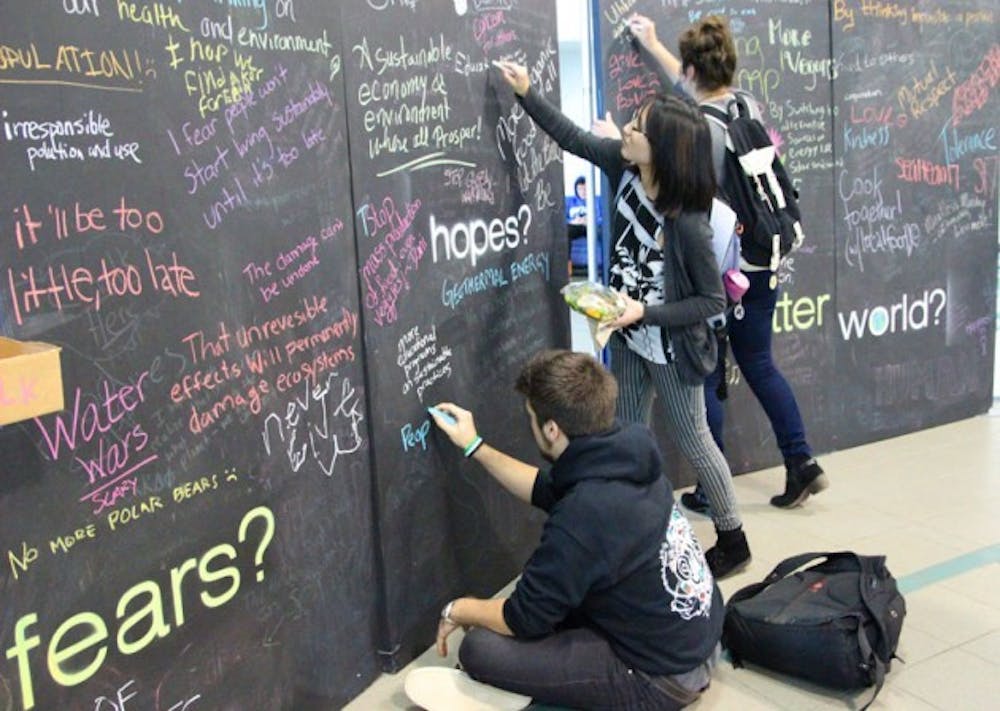Students on campus used UB’s first Sustainability Week to fight what Justin Imiola called “The Tragedy of The Commons.”
Imiola, a senior and president of the Environmental Network, doesn’t want The Commons, an area on campus that is privately operated, to use Styrofoam. So he and other environmentally conscious students used Sustainability Week, which encouraged environmental awareness on campus, to promote their petition to end the Styrofoam use.
Imiola said the petition was named in reference to an article by Garrett Hardin of the same name that says “individuals working in their own self-interest cause overall well being to be diminished, which is exactly what is happening at the Commons at UB.”
“In recent years, UB has almost stopped their use of non-recyclable products in the Campus Dining Centers and Shops,” said Alison Greene, a sophomore and member of the Environmental Network. “It’s a positive change, but we shouldn’t stop there.”
The Environmental Network, an environmental advocacy club, used the week’s exposure to get a petition signed to ban The Commons from using Styrofoam containers and cups.
So far, they’ve gotten at least 50 signatures, according Imiola, and are working to expand the petition online to have 1,000 signatures by the end of the semester.
“It’s part of our project to green the Commons and raise student awareness about how the commons is privately owned but we are showing that we have the support of the fellow students as consumers,” said Vanessa Dwyer, a sophomore environmental geoscience major and a member of EN.
Dwyer said they want to try to persuade the commons to follow UB regulations of less waste and recyclable materials, and to possibly have them expand to recycable containers.
The Spectrum was not able to reach First Amherst Development, which privately owns The Commons, for a comment.
Styrofoam, the trade name for polystyrene, has been highly criticized by environmentalists for its toxic manufacturing process and inability to be recycled. It was labeled the fifth largest creator of hazardous waste by a 1986 Environmental Protection Agency study.
“There are just so many other options they could use,” Greene said.
Imiola, who is an economics and geosciences major, said the petition to ban Styrofoam in The Commons is part of a larger effort to make The Commons more sustainable.
Imiola, who helped organize Sustainability Week, and other students are attempting to convince The Commons to convert from Styrofoam takeout containers to compostable alternatives like those offered at UB Campus Dining and Shops locations. They are also looking to find ways to increase recycling and other ways to make The Commons green.
Anna Augostini, a sophomore pharmacy major and a member of the Sustainability Undergraduate Academy, said she finds it shocking The Commons hasn’t already taken part in UB’s green initiative and finds the petition to be a responsible idea.
And many of UB’s green initiatives were on display during last week’s Sustainability Week.
Throughout the week, the Office of Sustainability had pop-up chalkboards with the questions “What are your biggest fears and hopes of climate change?” and “How can we create a better world?” Students could come up and write their thoughts with chalk that was provided.
The project was based on Candy Chang’s Before I Die chalkboard project that started in New Orleans and has spread across the world. It allows anyone to write a thought of what they want to do before they die.
The chalkboard was meant to engage the UB community to think about climate change in a global perspective and to create conversations from the chalkboard comments.
Greene said Earth Day shouldn’t be the only time during the year when students promote sustainability.
UB environmental clubs and organizations arranged the first Sustainability Week to create environmental awareness on campus. The week is meant to serve as a fall compliment to Earth Week, the week surrounding green initiatives in the spring semester around Earth Day.
“Personally, I want to promote environmental awareness as a whole,” Greene said. “While one week focused on environmental awareness won’t have an immediate effect, it still sets the tone for how we should all act 100 percent of the time.”
Four student groups – Environmental Network, Engineers for a Sustainable World (ESW), the Student Association and Alpha Kappa Chi (AKX), were a part of the creation of Sustainability Week.
Each day of the week focused on a specific environmental theme: sustainability, energy, nature, water and waste.
The clubs had tables in the Student Union educating students on each specific topic, sometimes with a small demonstration. For water day, Environmental Network hosted a water tasting that asked students to blind taste the difference between bottled and tap water.
Imiola said Dasani was often thought to be tap water, while the tap water and Poland Springs were considered to taste alike. He said most people preferred tap water and Poland Spring to Dasani.
A larger event then followed at night that corresponded with each theme. These included lectures from environmental experts, nature walks and hikes in Letchworth Woods and a cleanup of Lake LaSalle. The week concluded on Saturday with a sheet mulching of the campus garden.
Rebecca Oaks, a senior environmental engineering major, is a student leader of the Campus Garden group and thought sheet mulching was a “great finale” to sustainability week.
“It was a way for people to take everything they had learned during sustainability week, like energy and different sustainability practices, and bring them together for a big outdoor on campus project,” Oaks said.
The week was a good way to get students involved with the environment, Augostini said.
“A lot of students aren’t aware about these issues, especially when UB does such a good job at keeping this large campus environmentally efficient,” she said.
There are 904,270 pounds of waste are kept from landfills each year due to the campus’s ongoing composting and recycling efforts, according to UB’s website.
email: news@ubspectrum.com





